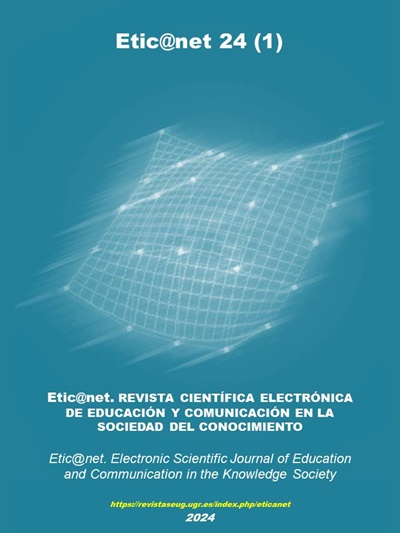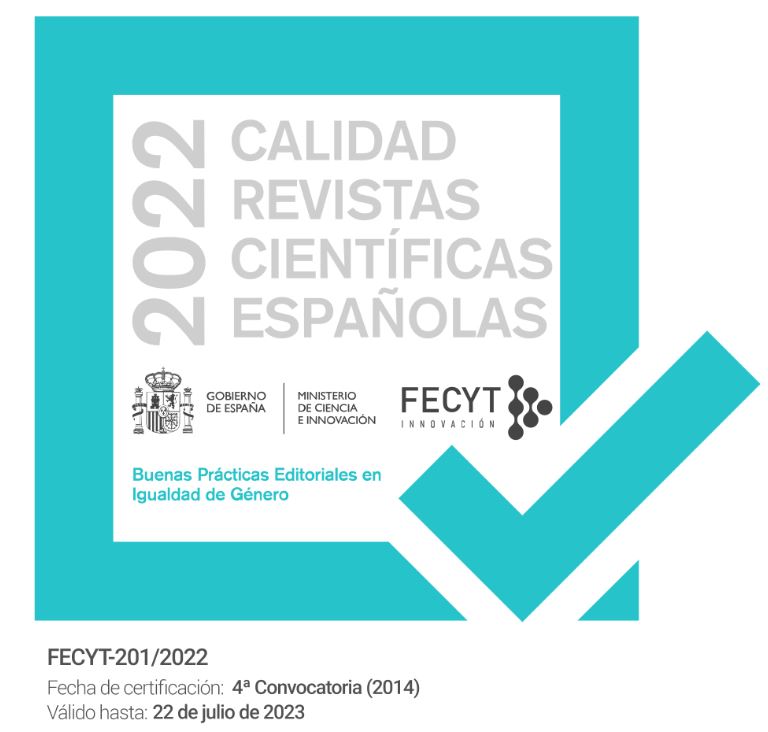Perceptions of mexican adolescents and youth regarding the credibility, trust, risks, and control of social media
DOI:
https://doi.org/10.30827/eticanet.v24i1.29021Keywords:
credibilidad, confiabilidad, redes sociales, riesgo, control.Abstract
The objective of this study is to understand the opinions of Mexican adolescents and young people regarding the use, credibility, and trustworthiness of social media content, as well as the risks and control associated with its use. The study employs a quantitative approach with a non-experimental design using a 45-item scale. A total of 856 individuals participated, with 58% being female and 40% male. The results revealed that as age increases, the perception of information validity also increases. Additionally, differences were found in the dimensions of reliability, risk, and control based on the participants' gender, with women consistently expressing higher scores in all cases. It was also observed that secondary school students have a lower perception of validity, while graduate students demonstrate higher levels of self-regulation in terms of the control dimension.
Downloads
References
Carrión Gordón, H., (2010). Redes Sociales: ¿Ambiente apto para menores? Hachetetepé. Revista científica de educación y comunicación, (1),105-110. ISSN: 2172-7910. https://www.redalyc.org/articulo.oa?id=683772635001
Cea Esteruelas, N. y ViCente Domínguez, A. M. (2021). La información de actualidad en las redes sociales: análisis de uso y percepción de credibilidad. Monograma. Revista Iberoamericana de Cultura y Pensamiento, n8, pp. 103-129. doi: 10.36008/monograma.2021.08.2418.
Cornejo, M., & Tapia, M. L. (2011). Redes sociales y relaciones interpersonales en internet. Fundamentos en Humanidades, XII(24), 219-229. https://www.redalyc.org/articulo.oa?id=18426920010
DataReportal (2023) Digital 2023: global overview report. https://datareportal.com/
De-Frutos Torres, B.; Pastor-Rodríguez, A. y Cruz-Díaz, R. (2021). Credibilidad e implicaciones éticas de las redes sociales para los jóvenes. Revista Latina de Comunicación Social, 79, 51-68. https://www.doi.org/10.4185/RLCS-2021-1512
Durán-Segura, M., & Martínez-Pecino, R. (2015). Ciberacoso mediante teléfono móvil e Internet en las relaciones de noviazgo entre jóvenes. Comunicar, 44, 159-167. https://doi.org/10.3916/C44-2015-17
García-Aviles, J.A.; Navarro-Mailo, F. & Arias-Robles, F. (2014) La credibilidad de los contenidos informativos en internet para los nativos digitales: estudio de caso Palabra Clave 17 (3), 875-894. DOI: 10.5294/pacla.2014.17.3.13
Gottfried, J. & Shearer, E. (2016) News Use across Social Media Platforms. Pew Research Center, www.journalism.org/2016/05/26/news-use-across-social-media-platforms-2016/
Heredia, N & García, E. (2017) Posibles riesgos del uso de las redes sociales en adolescentes. Revista de estudios e investigación en psicología y educación. Vo. Extr. (13) DOI: https://doi.org/10.17979/reipe.2017.0.13.2120
Herrero Curiel, E., (2015). La credibilidad de las redes sociales en el ámbito periodístico. Transinformação, 27(2),165-171. ISSN: 0103-3786. https://www.redalyc.org/articulo.oa?id=384351520006
Marugán Solís, F. & Martín Critikián, D. (2023). Redes Sociales y Generación Z. Doxa Comunicación, 36, pp. 381-399. https://doi.org/10.31921/doxacom.n36a1707
Peláez B. (2022) Estudio tendencias y comportamiento en redes sociales de compradores online 2022, Blog Capterra https://acortar.link/SBNhck
Pinto, A.; Cantón, I. & Santos, Y. (2019) Prácticas de riesgo en Redes Sociales y WhastApp por estudiantes de educación básica secundaria. Revista Espacios. Vol 40 (23), 7-20. https://www.revistaespacios.com/a19v40n23/a19v40n23p07.pdf
Pont, C.; Besalú, R.; Rovira, E.; Castelo, S. & Sánchez, M. (2019) Análisis de la credibilidad de la información política en el entorno digital. Informe ejecutivo de YouGov. España
Statista (2023) Informe de Statista: El uso de redes sociales en México. https://es.statista.com/estudio/79507/el-uso-de-redes-sociales-en-mexico/
Vázquez Luna, J.L. (2021) Las noticias falsas (fake news), la desinformación y la infodemia durante la pandemia de la Covid-19. Sintaxis. DOI: 10.36105/stx.2020edespcovid-19.09
Vosoughi, S., Roy, D., & Aral, S. (2018). The spread of true and false news online. Science, 359(6380), 1146-1151
Downloads
Published
Issue
Section
License
The authors who publish in this journal agree to the following terms: The authors retain the copyright and grant the journal the right to be the first publication of the work as well as licensed under a Creative Commons Attribution License that allows others to share the work with an acknowledgment of the authorship of the work and the initial publication in this magazine. Authors are allowed and encouraged to disseminate their work electronically (for example, in institutional repositories or on their own website) before and during the submission process, as it may lead to productive exchanges as well as further citation. Earliest and greatest of published works (See The Effect of Open Access).













